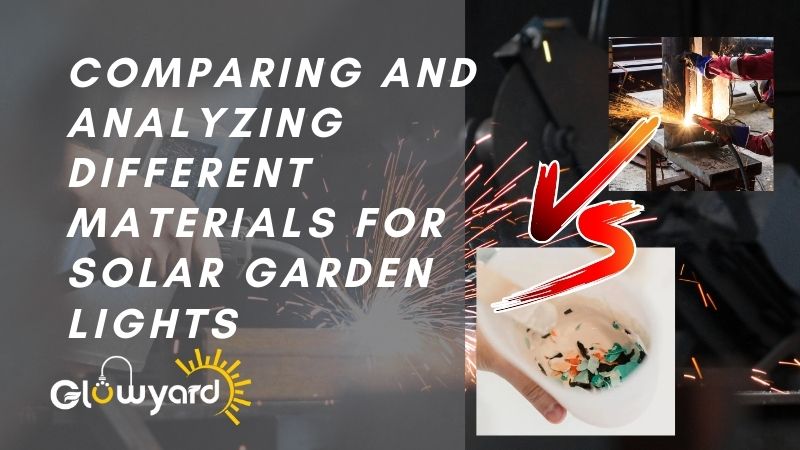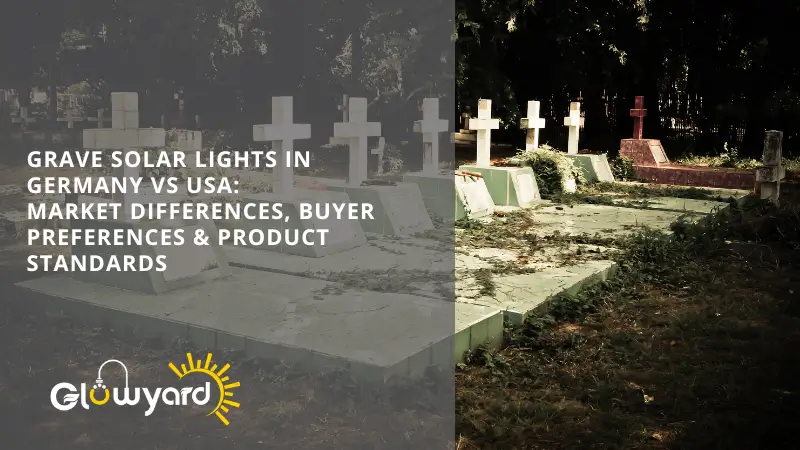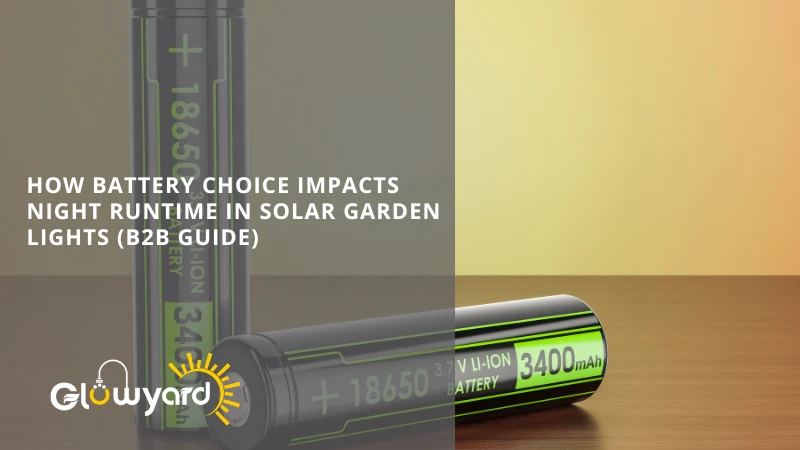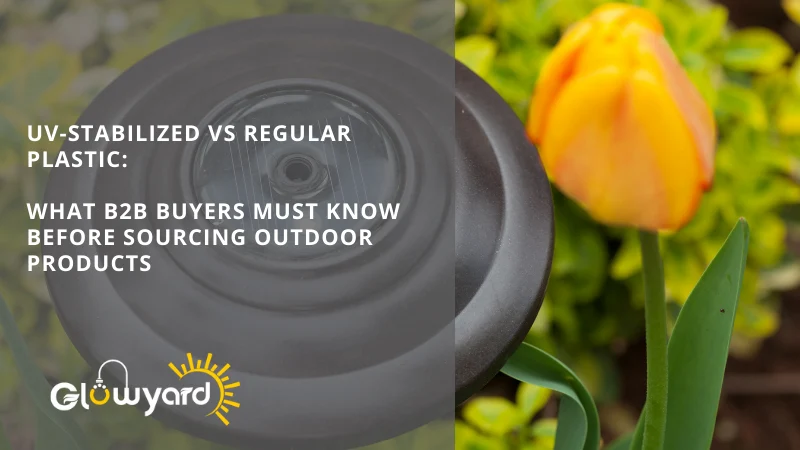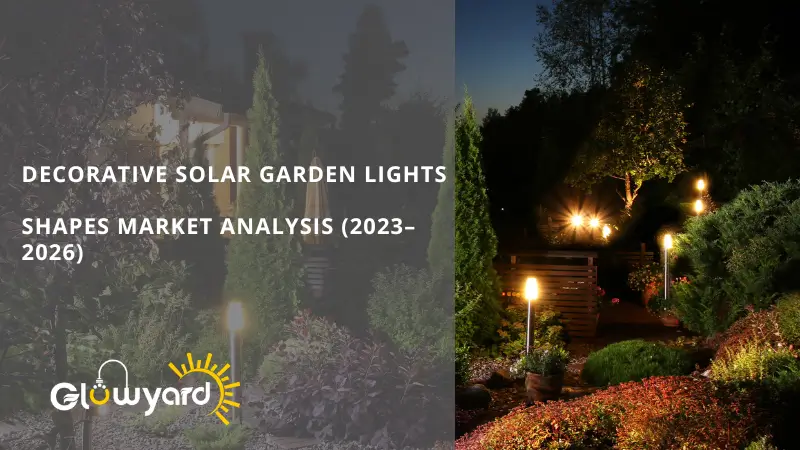Comparing and Analyzing Different Materials for Solar Garden Lights
When choosing materials for solar garden lights, it’s essential to consider not only aesthetics but also durability, weather resistance, and energy efficiency. The right material can make all the difference in performance and longevity.
Solar garden lights come in various materials, each offering distinct benefits. Common options include metal, plastic, glass, and resin, each impacting the light’s design, durability, and overall cost. Understanding these differences is key to selecting the best material for your needs.

Product choice, garden lights
As solar lights become increasingly popular in garden décor, understanding the advantages and limitations of various materials is crucial for making an informed decision. Let’s dive deeper into some of the most commonly used materials.
What are the key materials used in solar garden lights?
Understanding the composition of solar garden lights can help you choose the right option for your needs. Each material serves a specific purpose, balancing durability, aesthetic appeal, and cost-effectiveness.
Common materials used in solar garden lights include plastic, metal, glass, and resin. Each material comes with its own set of advantages, depending on the desired look and performance of the garden lights.
Recommended post for reading: How Factory Manufactures Solar Garden Statue Lights: A Complete Guide.
| Material | Advantages | Disadvantages | Best Use Case |
|---|---|---|---|
| Plastic solar garden lights | Affordable, lightweight, and versatile | Can become brittle with UV exposure and extreme weather | Budget-friendly, mild climates |
| Metal solar garden lights | Durable, resistant to wear, sleek appearance | Can absorb heat, expensive, prone to rust in some metals | Long-term durability, modern look |
| Glass solar garden lights | Elegant and transparent, allows light to shine beautifully | Fragile, prone to breaking under impact | Aesthetic appeal in controlled climates |
| Resin solar garden lights | Durable, flexible design, resistant to cracking | May not offer the same high-end appearance as metal | Weather-resistant, decorative designs |
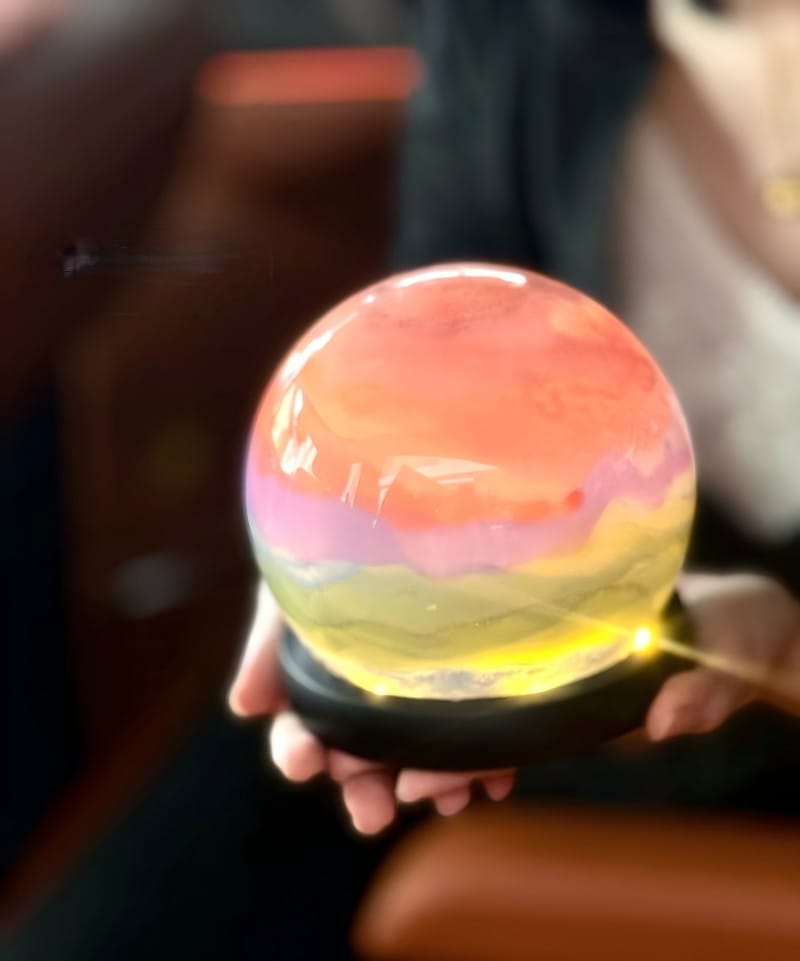
Glass ball light
How does material affect the performance of solar garden lights?
The material of a solar garden light directly impacts its performance, particularly in terms of durability, energy efficiency, and overall longevity. It’s not just about looks; functionality matters too.
Different materials affect how solar lights handle weather conditions, heat retention, and UV exposure. Understanding these factors can help you choose the most reliable option for year-round outdoor lighting.
| Material | Heat Retention | UV Exposure Resistance | Durability in Extreme Weather | Solar Panel Efficiency |
|---|---|---|---|---|
| Plastic | Can warp in high heat | Susceptible to UV degradation | Can crack in cold weather | Medium, can be reduced over time |
| Metal | Retains heat, may affect solar panel | Resistant to UV degradation | Very durable, resists rust | High, though heat absorption can be an issue |
| Glass | Does not absorb heat | Transparent, but fragile in UV-rich environments | Fragile in extreme weather, breaks easily | Excellent in stable climates |
| Resin | Low heat retention | Excellent resistance to UV degradation | Extremely durable in all weather | High, ideal for extreme climates |
What are the cost implications of using different materials for solar garden lights?
Cost is a crucial factor when selecting solar garden lights. The material chosen plays a significant role in the overall price, impacting both the upfront cost and long-term value of the lights.
Plastic solar lights tend to be the most affordable, while metal and glass options often come with a higher price tag due to their durability and aesthetic appeal. Resin lights strike a balance between cost and longevity.
| Material | Upfront Cost | Long-Term Value | Maintenance Cost | Best for Budget-Conscious |
|---|---|---|---|---|
| Plastic | Low | Low, may need frequent replacement | Low, but replacements may add up | Budget-sensitive customers |
| Metal | High | High, lasts longer with maintenance | Medium, rust may need treatment | Long-term investment buyers |
| Glass | Medium | Medium, fragile nature requires careful handling | High, due to fragility and maintenance | Aesthetic-focused customers |
| Resin | Medium | High, durable and low maintenance | Low, no need for frequent replacements | Balanced cost-to-value seekers |
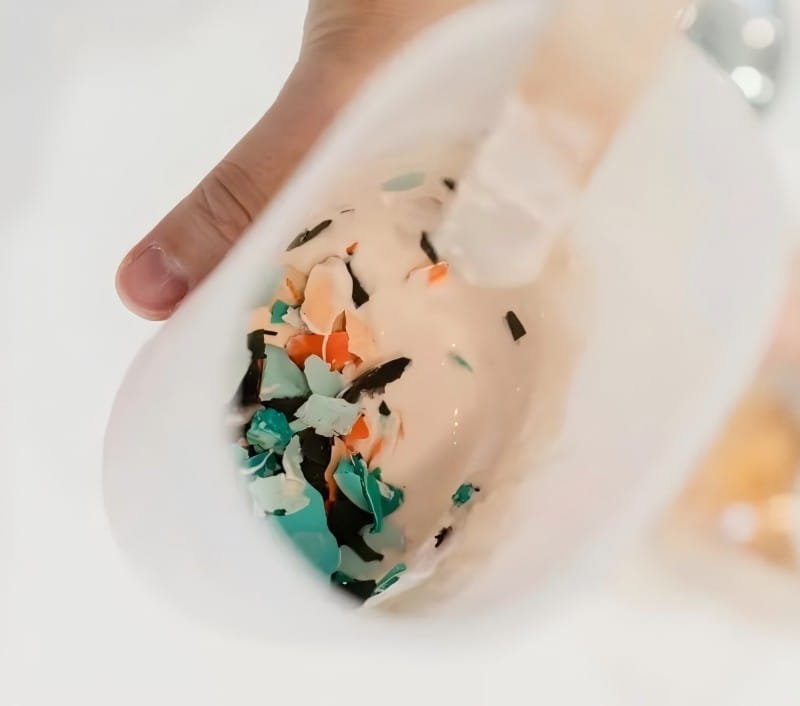
Colorful broken plastic pieces
Conclusion
Choosing the right material for decorative solar garden lights depends on your priorities, whether it’s affordability, aesthetics, or durability. Understanding the pros and cons of each material will guide you to the best option for your garden.
What Are the Advantages and Disadvantages of Metal in Solar Garden Lights?
Metal is a popular choice for solar garden lights, but is it the right one for every garden? Let’s explore its pros and cons to make an informed decision.
Metal offers durability and an industrial look, making it a popular choice for garden lighting. However, it also has its challenges, including susceptibility to rust and potential heat absorption issues.
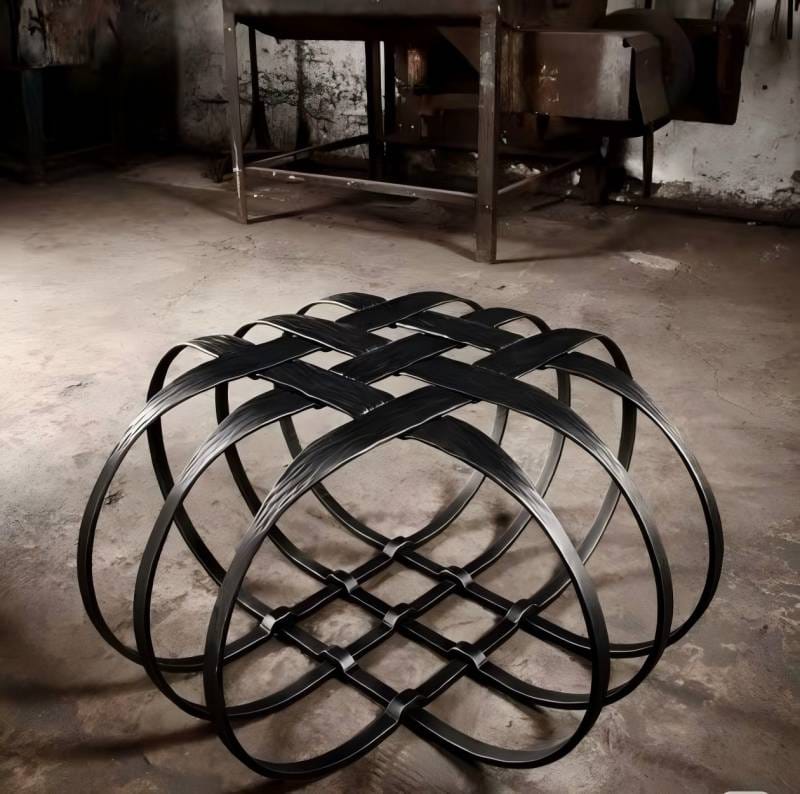
Metal woven frame
Metal is commonly used for its strength and sleek appearance, particularly in modern or industrial-themed gardens. Materials like aluminum, stainless steel, and copper are durable and can withstand rough weather conditions. However, metal can be prone to rust and corrosion, particularly if the coating wears down over time.
This makes maintenance important for ensuring longevity. Metal also tends to absorb heat, which can reduce the efficiency of solar panels under intense sunlight.
On the plus side, the metallic finish can add an elegant touch to garden aesthetics, especially in urban or minimalist settings. Still, the potential for wear and tear requires careful consideration.
How Does Resin Compare to Metal in Terms of Durability and Aesthetics?
While resin is a newer contender in the world of solar garden lighting, it offers unique benefits. Let’s compare it with metal to see how it stacks up in terms of durability and appearance.
Resin, known for its versatility and ease of molding, offers a lightweight alternative to metal. It is also more resistant to the elements, but may not provide the same premium look as metal.

Unfinished Resin Figurines
Resin is an increasingly popular material for solar garden lights due to its flexibility and cost-effectiveness. It is a synthetic material that can be molded into a wide variety of shapes and sizes, making it ideal for decorative purposes. Resin lights tend to be more weather-resistant than metal, as they do not rust and are less likely to suffer from wear and tear. They are also lighter than metal, making them easier to handle and install.
However, resin might not have the same premium, high-end look that metal provides. In terms of durability, resin can withstand most outdoor conditions, but extreme heat or prolonged exposure to UV rays may cause the material to degrade over time. While resin lights may not appeal to everyone’s aesthetic, their practicality in weather resistance and cost-effectiveness makes them a viable option.
Which Material Is Best for Weather Resistance and Longevity in Solar Garden Lights?
When it comes to outdoor lighting, durability in all types of weather is crucial. Let’s compare metal, resin, and other materials to determine which performs best in various environmental conditions.
While both metal and resin have weather-resistant qualities, resin generally outperforms metal in terms of long-term durability and protection against the elements.
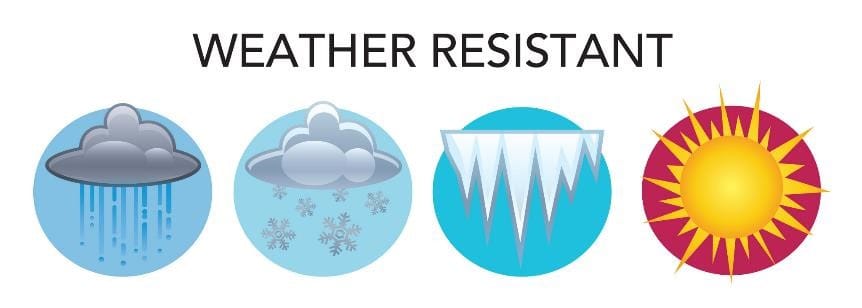
weather-resistant
For outdoor use, weather resistance is one of the most important factors to consider when selecting materials for solar garden lights. Resin is highly weather-resistant, as it doesn’t absorb moisture or rust like metal. It holds up well under rain, snow, and extreme temperature fluctuations, making it an excellent choice for areas with harsh climates. Resin’s UV resistance also ensures that it won’t fade or crack under the sun’s rays.
Recommended post for reading: How to Improve the Durability of Plastic in Solar Garden Lights Under Outdoor Sun Exposure?
Metal, on the other hand, while durable, requires proper coating to prevent rust, especially in humid or rainy environments. Additionally, metal can experience fading and damage from prolonged sun exposure. Some metals, like copper, develop a patina over time, which can either be a desirable feature or something that detracts from the overall appearance. For long-lasting performance and minimal maintenance, resin is often the better choice when it comes to weather resistance.
Conclusion
When choosing between metal and resin for solar garden lights, resin offers superior weather resistance and durability. Metal, however, may be preferred for its aesthetic appeal in certain garden designs.
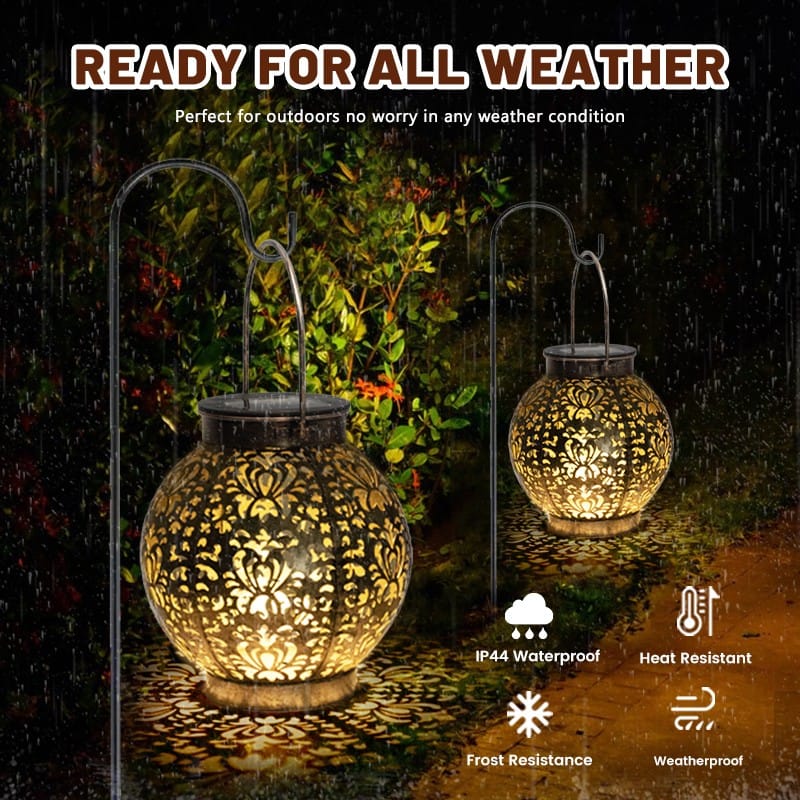
Metal solar hanging light Ready for all weather
Are you looking for a Certified Solar garden lights supplier?
At Glowyard Lighting, we are passionate about providing the highest quality solar garden lights that are both stylish and durable. As a leader in the solar garden lighting industry, we offer a wide variety of lighting solutions designed to suit every need. From weather-resistant resin options to elegant metal designs, our products are engineered to enhance your outdoor spaces while ensuring longevity and energy efficiency.
If you’re a outdoor lighting distributor, retailer or brand owner who is looking for a certified & trusted solar garden lights manufacturer, feel free to reach out. We offer:
- Free samples for qualified buyers
- OEM & ODM for solar garden lights
- Full pre-shipment QC and warranty support
📩 Contact us today for the latest catalog and exclusive B2B offers.

Glowyard new solar garden light product launch with creative outdoor designs

